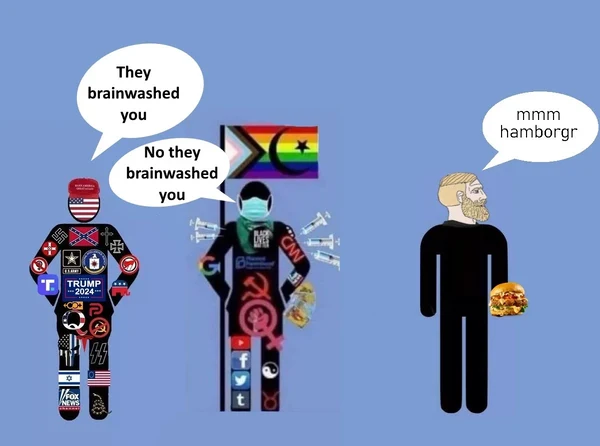https://interpersonal.stackexchange.com/ is close to dead these days but I still look at it every so often. Today I found this old question that was inexplicably bumped to the top.
This morning, my brother sent me a short message:
Come get some strudel
I was going to reply
Thank you, but I don't feel like eating strudel right now
Before I could send the message, I was intercepted by a relative, who tried to teach me a lesson about politeness, saying that the above reply would be rude. The relative's suggestion is to lie and write something along the lines of "Thank you, but I just ate something".
I fail to understand why my suggested reply is rude, and on the other hand, find the suggestion dishonest and therefore inappropriate.
What is a polite way to turn down your brother's who lives next door dessert invitation?
Why anyone would ask Stack Overflow for interpersonal skills is beyond me, but let's see what they have to say.
Did you just eat something? If not, then saying "Thank you, but I just ate something" is a lie. Lying to your brother is very rude. He may not know it at the moment, but it is very rude. Don't lie about trivial matters.
White lies are bad.
Someone else has an answer:
As a person on the autism spectrum, I've frequently been told that what I'm saying may be rude, but in my personal experience it has turned out to not be interpreted by the other person as such. There's someone else who's written about this exact scenario on their personal blog, in the post Six Rules Regarding Autistic Interaction [...]
This is a good person to take advice from.
Based on their experience and mine, I've often found that lying to a person as to why I couldn't do something causes hurt, especially if they later somehow find out the real reason, whereas being more direct is either simply accepted (80% of the time) or initially comes off as off-putting but they eventually understand within a few minutes (the other 20% of the time).
1. Be autistic
2. Be blindingly honest in every interaction
3. Success?
And the piece de resistance from someone who may well have some form of psychosis (I'm not quoting this because I can't be arsed, the entire rest of this post is this one guy's comment):
Intro
Your reply isn't rude, but your reply doesn't match the tone of the message you recieved. Since this is your brother then it would typically be standard to reply back using conversation that aligns more with restricted code over elaborated code.
Restricted code
This is speech that is dependant on context, relying on the shared understanding between an in-group. This type of language reflects familarity and is typically considered "warm". This also allows for less verbose speech for easier and faster communication.
For example this was a past text message conversation between me and a roommate (male,platonic)(certain details removed to protect identities/privacy). This is an example of a question and answer using restricted code:
roommate: Can u go in the draw on my desk the long one pause and get the <restaurant> menu
me: Cant send images to <phone brand/model>
roommate: I just need the number to them
me: <phone number>
roommate: Preciate it
As can be seen in this conversation there are almost no formalities used except at the end of the request. Text is economical, providing exactly the information needed. It sounds like a conversation would sound.
Other parts represented in this type of speech are use of written asides/jokes:
long one pause
And use of Eye Dialect
Preciate it
Elaborated code
This is speech that is not dependant on context and can be understand by anyone regardless of whether they are in-group or out-group. The point of this speech is to ensure understanding, but is rarely used between family members.
For example, this is a text conversation using elaborated code between me and a job recruiter (details removed to protect identity/privacy).
recruiter: Hello Maximilian, this is <Recruitor's Name> with <Company1>. I received your application for the position of <job>. Are you still interested in this position? [...]
My apologies. I accepted a position at another company.
No worries. Thank you for responding.
As you can see this conversation has a liberal use of formalities and can be understand without almost any context needed. The conversation is obviously between two strangers and there is not a shared upon agreement for lexicon, dialect, tone, etc to be used. Since there is no context for this conversation it will be as general as possible to ensure the maximum amount of people may understand what is being said and as well as being as curteous as possible to minimize chance of offendending.
The Question Directed At You (Restricted Code)
The text you recieved uses similar level of restricted code in comparison with my first example:
Come get some strudel
The meaning of this is completely dependant on the shared context between you and your brother. It matches the level of restricted code typically seen in English between people of the same family, and may be a little more concise than spoken word because of the medium (text).
Your Reponse To This Question (Elaborated Code)
Your reply on the other hand utilizies more elaborated code than restricted code:
Thank you, but I don't feel like eating strudel right now
Not only does this create dissonance in tone of the conversation due to the mismatch of code used, it also may even convey a level of distance in how you view your relationship with your brother. Examples of why this is elaborated speech include: use of the character ,, verbose phrase usage "thank you" rather than "thanks".
I am going to elaborated though more specifically about a particularly dissonate detail in your reply:
I don't feel like eating strudel right now
This is an elaboration that is verbose since the context with what you want to do with said strudel is understood and does not need to be said, the example of this phrase in restricted language would be:
I don't feel like strudel right now
This would not effect tone much if not for how it also works to avoid use of mimicry in regards to verb usage, the question was
get some Strudel
The response elaborates needlessly and inserts verb that is different and more clear to the restricted code use of get some.
Reply That Matches Restricted Code
I do not know the exact relationship you have with your brother, however since he initiated with the first message using a liberal amount of restricted code and since he is a direct family member, I would assume you would want to reply back in restricted code and with the same type of tone.
There are many ways to say this and it will depend on your relationship and shared lexicon/ dialect between you and your brother, however the words thanks and good are generally what the main words should be in your reply (in most circumstances).
I think the reply that would best fit in this circumstance would be:
This is a phrase I use liberally and have never been called rude when I use it in informal situations that warrant restricted code.
Linked as well is the urban dictionary entry for "nah im good", which has 91 upvotes and 10 downvotes with the first definition being:
A casual way of saying "No thanks"
However, if that is not your style then here are a few more examples that may work:
Im good,Im good thanks,Im good thanks thoughThanks but im goodIm fine right nowNah im good for right nowNot feeling strudel rnNah im not feeling strudel rnNah im chillin













Jump in the discussion.
No email address required.
The further reading and explaining Elaborated and Restricted code is interesting. Definitely something worth learning about, even though its a huge response to a throwaway type question.
What I find interesting is how people of higher social status use Elaborated code more frequently and people of lower status use Restricted code more so.
Its like how black people saying things in ebonics that make no sense unless you understand the context, compared to white people who have to have everything be proper English and super verbose. (im white btw as you can tell)
Jump in the discussion.
No email address required.
More options
Context